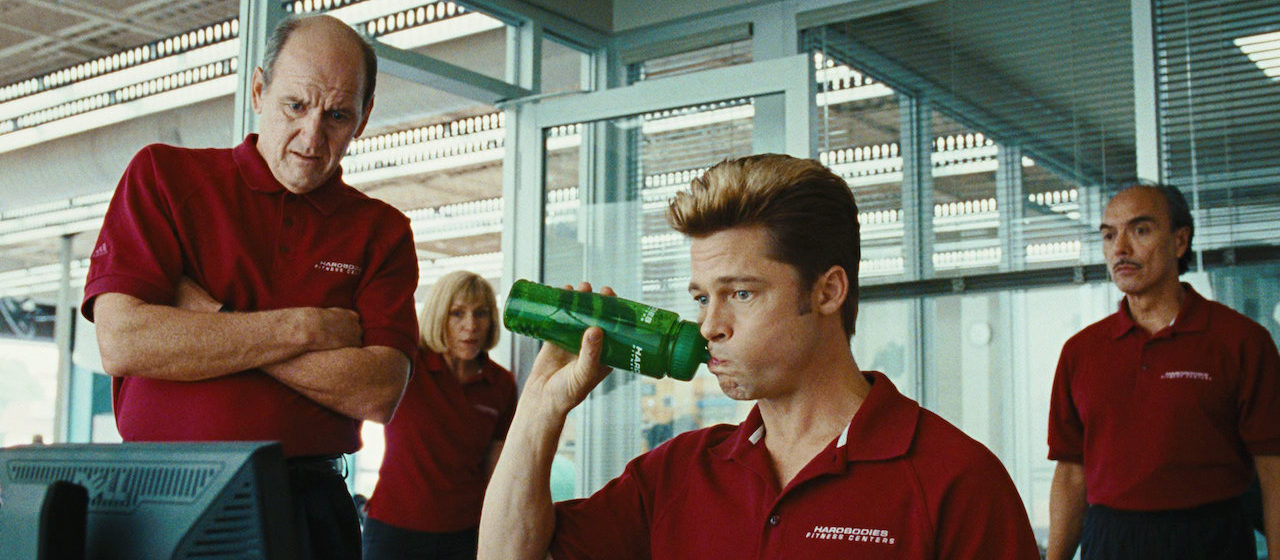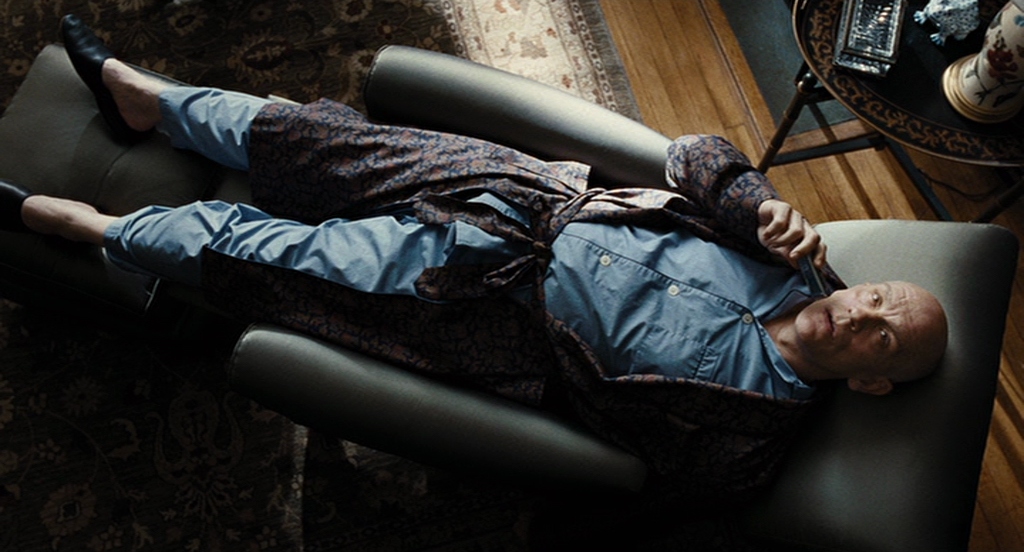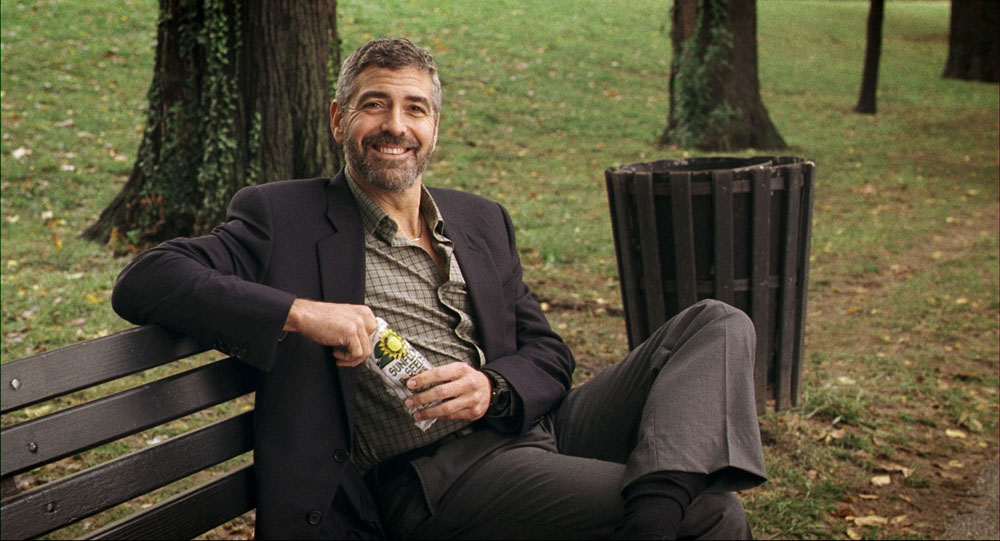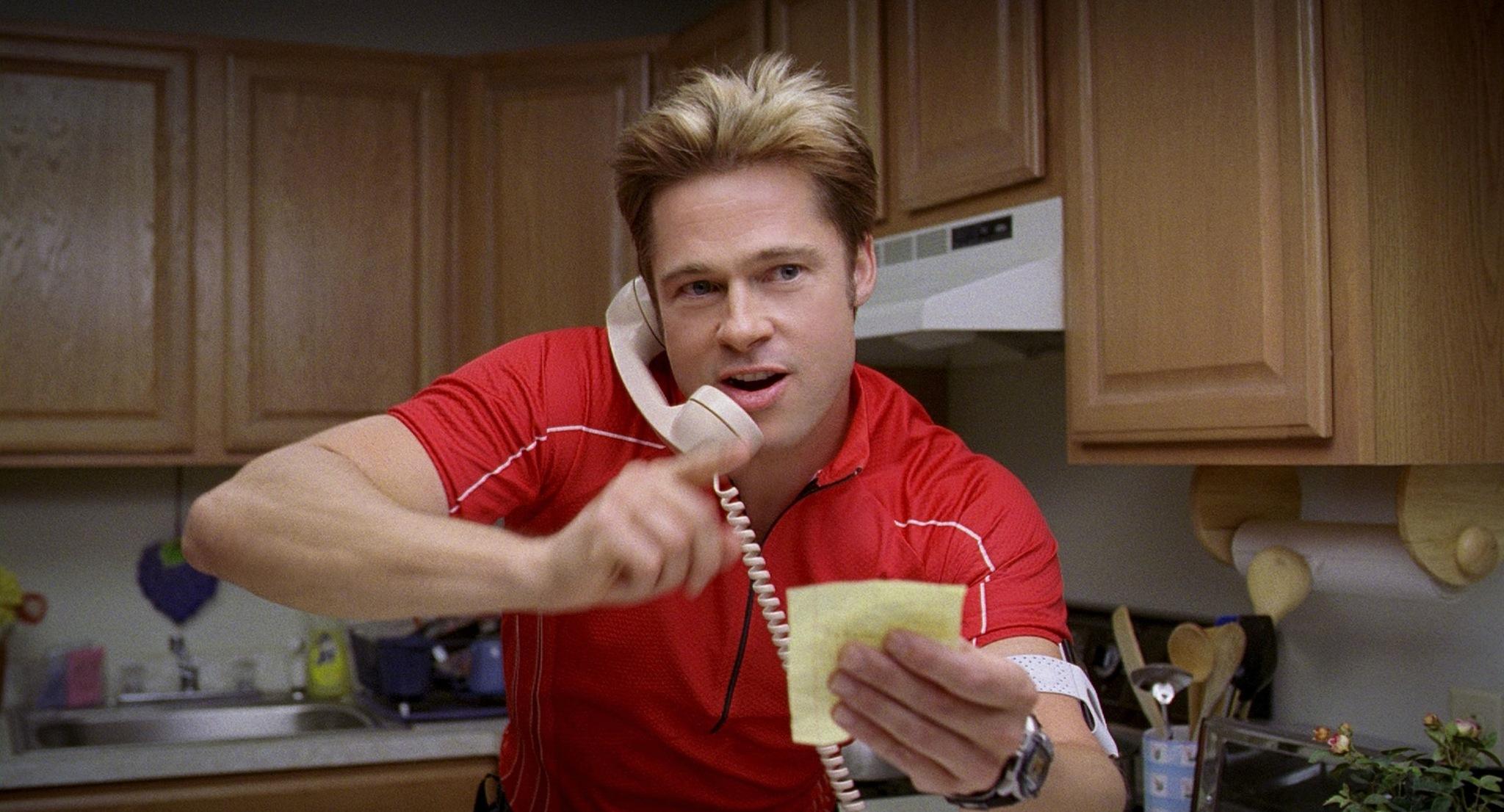

“I have a drinking problem? You’re a Mormon—compared to you we all have a drinking problem!”
Burn After Reading is a farcical spy thriller populated with idiots—bumbling gym bros, paranoid lotharios with sex machines in their basements, ex-intelligent agents with inferiority complexes. In the deft hands of the Coen brothers and an A-list cast, these idiosyncratic characters transform an absurd story centered around a misplaced CD into a riotous black comedy replete with enough F-bombs to make Mr. Tarantino blush.
Skewering the likes of Bond and Bourne, the Coen comedy cranks up its characters’ sense of self-importance while dialing back their capabilities, twisting their motivations, and stripping away most of the action. But even though the story beats and characters are uniformly preposterous, the Coens present their absurd tale with utter sincerity. In terms of tone and formal style, the film takes itself as seriously as its ensemble of halfwits take themselves. Driven by their vices, a ballooning cast of vainglorious morons gradually becomes tangled in a web of adultery, blackmail, stakeouts, trespassing, private eyes, CIA officers, Russian agents, and so on and so forth. There’s no lesson to extract, no observation on human nature—just an elaborate joke with a punchline that cynically underlines the rampant wickedness and lack of self-awareness that plague modern society.
Like several other Coen comedies—e.g. Raising Arizona and The Big Lebowski come to mind—the funniest parts of Burn After Reading exhibit that wonderfully subtle type of humor that reads as amusing on the page but only truly comes to life when those lines are delivered to utter perfection on the screen. I had seen the film twice before this latest viewing, the most recent being almost ten years ago, and yet I found myself on the cusp of reciting numerous lines with correct intonation. One of the most memorable of these comes from Ted (Richard Jenkins)—a gym manager who has traded in his priest’s robes to watch over a flock of treadmills—when he’s found snooping around in the basement of ex-CIA analyst Osbourne Cox (John Malkovich). “I know you,” Cox says. “You’re the guy from the gym.” “I’m not here representing Hardbodies,” Ted replies.

Another comes from Manolo (Raul Arañas), a janitor at Hardbodies who finds a CD on the floor of the ladies’ locker room; a CD that happens to contain intelligence data ripped from Cox’s harddrive along with drafts of his “mem-wahs.” Vacuous trainer Chad (Brad Pitt) decides to investigate and finds “like, numbers, arrayed. Numbers and dates and numbers and numbers and dates. And numbers… the raw intelligence.” Chad and Linda (Frances McDormand) sense an opportunity to make a buck through blackmail and try to cover up the disc’s discovery, but Manolo doesn’t catch the drift and continues to bluntly state how he found it.
Chad: Manolo, you didn’t find this.
Manolo: I found it on the floor there.
C: Yeah, I know, but…
M: Right on the floor there. Just lying there.
Or take Harry Pfarrer’s (George Clooney) lines when he hooks up with Linda (Frances McDormand) through an online dating site while his wife (Elizabeth Marvel) is out of town—even though he’s already in a long-term adulterous relationship with Cox’s wife Katie (Tilda Swinton). Harry brings Linda home to show off the mechanism that he’s been secretly working on in the dark depths of his basement. “Yeah, I tell ya. I saw an ad for this in a gentlemen’s magazine. Twelve hundred bucks. I’m lookin’ at this thing and I think, ‘You gotta be kiddin’ me.’ I’m a hobbyist. Thing’s basically nothing but speed rails. I figure I’d go down to Home Depot and whip this up myself for… a hundred bucks.” He gently pats the contraption’s seat. “You sit down there, make yourself comfortable, put your feet in the stirrups, and…” He lets the seat glide forward and a pink dildo pops up through a crevice in the seat cushion. “It’s something, isn’t it? Hundred bucks, all in—not counting my labor, and the… cost of the dildo. Those things aren’t cheap. See, I’d like to… I’m not set up to mold hard rubber.” It’s a bit sprawling and the punchline is more shocking than funny, but the conclusion is what gets me. The way he briefly starts on a tangent about why he had to buy the dildo instead of making it himself like a good hobbyist would, then thinks better of it and ends the conversation.

The reason that these humorous lines work so uniformly well is that the Coens wrote no fewer than five of the roles with the actors who portray them in mind. George Clooney, Brad Pitt, Frances McDormand, John Malkovich and Richard Jenkins all had characters tailor-written for them. In the case of Clooney’s neurotic libertine, Pitt’s brainless gymrat, and McDormand’s narcissist who is hellbent on undergoing four different cosmetic procedures, these characters are essentially twisted versions of the actors’ public personalities that poke fun at the common perceptions about them. Of course there are deviations too; weird things like Harry’s obsession with flooring materials, his habit of running after sex, and his penchant for the hypochondriacal fabrication of food allergies (e.g. “lactose reflux”). Each character is impeccably written, from their quirky personality traits and murky values down to each “um” and stutter and clearing of the throat. And while Linda’s tragicomic quest to purchase physical beauty serves as the film’s focal point, it is the sublimely airheaded, gum-chomping, half-bleached Chad who carries the film with his faux-sophistication, undying optimism, and excellent delivery from Pitt. In a film positively crammed with quotable lines, Pitt stands out prominently with his hilarious mannerisms and comedic timing. “Appearances can be… deceptive.”
This dodgy story is capped off by a series of asides featuring Dave Rasche and J.K. Simmons as a pair of CIA higher-ups who are monitoring the situation from afar and display a chilling lack of empathy. The film turns violent in fits and starts, including one notably shocking on-screen death that had my wife reeling, wondering how the film could continue in its wake. At each juncture, Simmons’ character is primarily concerned not with the wellbeing of the people involved in the situation, but with ensuring that all loose ends are tied up. When told that a man has been shot, he absentmindedly replies, “Good,” but then corrects himself: “Great! Is he dead?”

The death I refer to, is, of course, Chad’s. It is rivaled by Marvin’s death in Pulp Fiction and perhaps a few others in terms of shocking hilarity. Chad has broken into the Cox home to search for more “intelligence,” blissfully ignorant of the domestic troubles between Osbourne and Katie. He pumps himself up while he waits in the car by doing a little dance with his earbuds blasting some popular music. When he sees Katie drive away with Harry, he decides to make his move, unaware that Katie is going to drop Harry off a few miles away so he can run back to the house. And so, shortly thereafter, Chad finds himself hiding in a bedroom closet chomping on his gum while Harry sings in the shower and gets dressed a few feet away. Then he opens the closet door. There’s a split-second where Chad tries to improvise and gives Harry a big idiotic grin—a blink-and-you-miss-it image that is destroyed when Harry instinctively shoots a hole through Chad’s forehead from point-blank range. It’s shocking, for sure, but if you connect with the Coen’s sense of humor, it’s also terrifically funny.
By the film’s end, the only character to escape unscathed is Linda, who “plays ball” with the CIA, sitting on everything in exchange for the four plastic surgeries she so desires. It just so happens that the only two people who actually cared about her were brutally murdered in the process and her new lover has jetted off to Venezuela. So, maybe chalk it up as a draw.
Burn After Reading is chock full of self-absorbed lunatics who think the world revolves around them. For an hour and a half, that’s actually true, and the results are simultaneously bleak and hysterical, though ultimately meaningless and exceedingly vulgar.